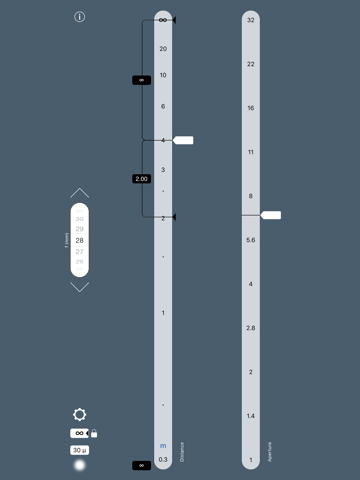
TrueDoF Depth of Field Calc
The TrueDoF range of apps represents a major step forward in working with depth of field.
This elegant app shares with its siblings the same core features: A clean and clear interface, ease of use, real-time updating of output and, above all (but conveniently hidden under the hood, as it were), the most advanced depth of field algorithm you’ll find on the App Store.
The TrueDoF range is unique in that its calculations can take into account the effects of diffraction. This gives a MUCH MORE ACCURATE indication of how sharp the image will be. Not comfortable with this diffraction business? No problem — simply deselect that feature and instead use the app as a traditional depth of field calculator. Youll retain all the fabulous ease of use features! See the notes below for details on all this.
Theres no need for long descriptions here — youll know what to expect if youve tried the free version, TrueDoF-Intro. This version adds:
• An expanded aperture scale, reading from f/1 to f/32
• Support for medium format cameras
• A hyperlocal button (and an associated hyperlocal mode)
• The option to display front and rear depth of field as percentages
• Rapid selection buttons for the focal length scroll wheel
• Display of your chosen blur spot diameter (circle of confusion) on the main screen
Youll find youll never want to go back to the old ways of calculating depth of field.
And if you like this version, wait till you try TrueDoF-Pro! Check it out, and its HUGE list of features, here on the App Store.
Notes on Diffraction:
Diffraction is the blurring caused when light passes through small apertures. In calculating depth of field, this app can take into account the effects of diffraction. In using the app, you will notice that, as you increase the f-number, you reach a point where the depth of field actually begins to drop. This is due to diffraction. At some large f-number, the width of the region of acceptable sharpness drops to zero. This is because, at such an f-number and above, diffraction produces so much blurring that you cannot achieve the sharpness standard (circle of confusion) that you have specified.
It is particularly important that the effects of diffraction be taken into account if youre using digital cameras with sensors smaller than 35 mm format, where diffraction seriously compromises image quality at the top end of the aperture scale. Lenses on 35 mm cameras stop down to about f/22. There’s a reason why they don’t go any further. But f/22, or even f/16 or f/11, is too much for cameras with smaller sensors. With TrueDoF, you can avoid using apertures that are damaging to image quality.
Notes on Intended Use:
TrueDoF is designed for photographers who want an accurate, versatile and easy way to calculate the depth of field produced by their chosen camera settings. There are some types of photography, e.g, landscape photography, where it is preferable to work the other way around, i.e. first specifying the depth of field you want (by setting the distances to the nearest and furthest objects that you wish to appear sharp in your photograph) and, from that, determining the camera settings (focus distance and aperture) that will give you the sharpest possible image. For that approach, check out OptimumCS-Pro, the unique optimum camera settings calculator, also available on the App Store. And, if you would like to achieve insanely huge depth of field — with astonishing image sharpness — try the FocusStacker app. Now its remarkably easy to achieve consistently excellent results when using the focus stacking technique in landscape and architectural photography.



